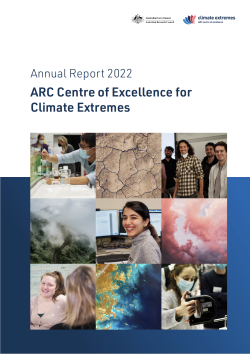
The year 2022 was one of vigour and renewal for the Australian Research Council (ARC) Centre of Excellence for Climate Extremes. While Covid-19 is still with us, the end of lockdowns and restrictions on travel saw a return to face-to-face meetings, science workshops, in-person professional development activities and serendipitous corridor conversations.
The Centre of Excellence for Climate Extremes has become a cornerstone of Australia’s climate research efforts. The ARC’s investment in the Centre enables the university sector to work on long-term, foundational science projects that require critical mass, which can only be achieved by collaboration across institutions and disciplines. This report highlights just a small sample of the exceptional scientific advances that would otherwise have been unimaginable without this Centre.
The Centre of Excellence is not only focused on cutting-edge science: 2022 saw a concerted effort to increase the visibility of the Centre and its impact beyond academia. There was a significant increase in the number of briefings provided to parliamentarians and senior policymakers. The Centre made several formal submissions to inquiries, and staff and students engaged in a wide range of activities that are listed in this report. Much of this effort was ably coordinated by the Centre’s new Engagement and Impact team members.
Early in the year the Centre released its first State of Weather and Climate Extremes report for the preceding year (2021). This report, produced primarily by early career researchers and collated by the Centre’s exceptional Engagement and Impact team, outlined notable extreme weather and climate events that affected Australia in 2021. It cited research undertaken by Centre scientists and elsewhere that explain these phenomena.
Examples included research on record-breaking heatwaves in Western Australia, the highly unusual Tropical Cyclone Seroja and significant storms in south-east Australia associated with East Coast Lows. The report was distributed widely among state and federal government departments and industry partners and received very positive feedback. The 2022 report will no doubt be an equally insightful – though sobering – read after another year of record-breaking rains and other extremes for Australia’s continent and marine environments.
Without a doubt, the ARC Centre of Excellence for Climate Extremes offers its researchers and PhD scholars an unparalleled environment in which to conduct science and grow their careers. I once again this year congratulate the ambition and dedication of the Centre’s leadership team in realising this vision and in making such a strong and positive mark on the Australian research landscape.
Dr Tony Press AO
Chair, ARC Centre of Excellence for Climate Extremes Advisory Board
ARC Centre of Excellence for Climate Extremes – Annual Report 2023
From the Chair of the Advisory Board
Climate Science Leaders of the Future
Weather and Climate Interactions Research Program
Attribution and Risk Research Program
Ocean Extremes Research Program
Computational Modelling Systems
Governance, Management and our Commitment to Equity, Diversity and Inclusion

